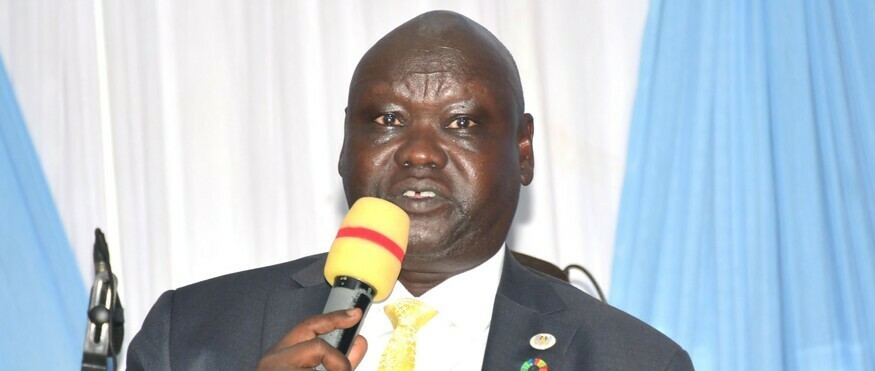South Sudan’s Minister for PeaceBuilding Stephen Par Kuol said that South Sudan is not prepared for elections, pointing out the lack of necessary preparations for conducting elections next year.
Minister Par, a leading member of the opposition SPLM-IO led by First Vice President Riek Machar, was speaking during a panel discussion at the UN Day event in Juba on Tuesday.
The minister also stressed that the country’s leadership is committed to preventing a return to war, but the required processes for post-election management are not in place.
Par underscored the collective responsibility in shaping the nation’s future, highlighting the importance of engaging various sectors, including intellectuals, academia, civil society organizations, and clergy, in critical thinking. He emphasized that the government should not bear the sole burden of thinking for the people, as valuable insights often emerge from the people themselves.
“The government alone should not bear the burden of thinking for the people. Often, the most insightful ideas emerge from the people themselves because our focus here is not just on the government; it’s about the people,” Par explained.
He emphasized that the pursuit of peace is a collective effort meant for the people and commended the Transitional Government of National Unity (RTGONU) for providing the essential leadership in the peace process. Par clarified that the government’s primary mandate is to implement the peace agreement and cultivate a peaceful environment, which is the foundation for nation-building.
In Par’s words, “The current government has a singular mandate. In my humble opinion, this government is primarily a peace-oriented government, not a government focused on development. Development discussions can only occur in the presence of a peaceful environment.”
He also conveyed a strong commitment to overcoming the current challenges and preventing a return to war. “We will overcome our current challenges. I want to convey to our children, everyone in this room, and the South Sudanese people, no matter where they are, that we cannot afford another war. The peace process we are pursuing is irreversible; we cannot revert to conflict,” he assured.
When discussing the path forward and potential solutions, Par highlighted the importance of understanding the purpose of elections. He pointed out that the conditions for holding elections do not currently exist.
“The country must first be in a state of peace, and the required conditions for elections must be established. However, even if elections are not feasible, leaders in the country should explore alternatives to war, working together to find peaceful solutions,” he said.
“This solution will come from all of us, but the leadership must also be accountable and responsive to the people’s demand for peace. We must lead peace just as we led in times of war. It’s unacceptable to consistently win wars and yet fail to secure peace. The people of South Sudan should not be subjected to further conflicts, as it’s the people themselves who bear the brunt of these wars,” Par emphasized.
The Minister for Peace Building also discussed the importance of addressing the root causes and triggers of insecurity in the country when implementing peace. He highlighted the issue of intercommunal violence, attributing it to the breakdown of government institutions. Par stressed the need to address security arrangements as a crucial step in the peace-building process.
To establish a foundation for peacebuilding, Par emphasized the active implementation of the agreement to eradicate all forms of violence in the country, stating, “Unless we actively implement the agreement by eradicating all forms of violence in the country, there can be no foundation for peace building. At present, we witness armed communities in conflict with each other, and sometimes even in opposition to the state. State institutions have long since crumbled, and self-defence has become the norm as individuals take up arms to protect their communities.”
The Minister highlighted the importance of beginning with Chapter 2 of the peace agreement, which was initially intended as a transitional task. This chapter addresses transitional security arrangements, which involve the unification of armed forces that have been in conflict with each other for the past nine years.
South Sudan was meant to conclude a transition period with elections in February 2023, but the unity government failed to meet key provisions of the agreement, including drafting a constitution and unifying the army.
The parties to the agreement extended the transitional government’s time in office for another two years, meaning general elections would be held in December 2024.




